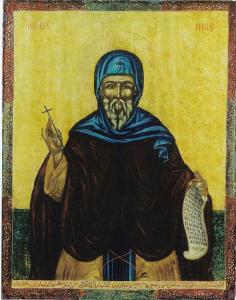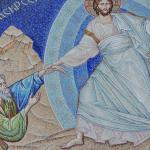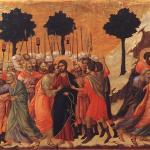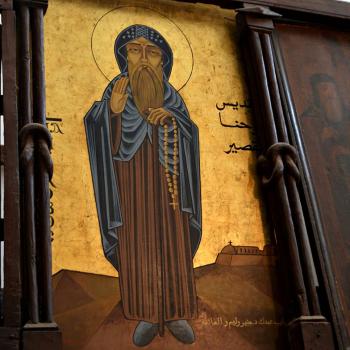
St. Antony the Great presented a middle way for the Christian faith. While he was an ascetic, and promoted asceticism, he knew that some would go too far, push themselves too hard, trying to do extraordinary feats out of vainglory and pride, and in doing so, they would end up undermining their own ascetic labors. They will either break down, as they push their bodies too hard, or they will end up embracing the vainglory and pride in such a way that their labors will have been for nothing. He knew this was not something which only happened with monks, those called to the religious life, but he also knew how the religious life tended to create the opportunity for this kind of error. Excessive zeal, no matter one’s vocation, can lead someone to do all kinds of extraordinary feats, but all it does is leave them unbalanced, as they ignore the holistic good. Thus, abstaining from any kind of food for several days might sound worthwhile, but what is the point of such a fast, what, exactly, leads someone to engage it? Often, it is pride, and what good is there in not eating physical food if one gorges upon such spiritual poison?
Presumption can lead people to engage one extreme or another. Either they push many harsh demands upon themselves or others, or they end up becoming too lax, denying the need anyone has to work for self-improvement. The middle path, whenever it is taught, is shown to be found as a way which avoids both extremes; those extremes contain various dangers, various pitfalls which prevent proper spiritual development. We need to learn how to push ourselves beyond where we are at while also not pushing too hard, to accept our limitations. We should not exhaust ourselves by trying to do too much. We must not try to show off, doing more than is prudent, while also, we must not let sloth get the best of us, making us think any difficulty which confronts us is an extreme to be rejected.
As a monk, as an ascetic, St. Antony was especially concerned with those who tried to push themselves too hard, for he saw how easily they could be worn out, and they will have been worn out for no good reason. Indeed, they would not have gained anything from what they have done. St. John Cassian, in a discussion given to him by Abba Moses, related how the monastic community remembered this through a lesson St. Antony was said to have given:
For we often see that those who keep fasts and vigils most rigorously and who live far off in the solitude in wondrous fashion, who also deprive themselves of any belongings to such an extent that they do not much as along a single day’s food or one denarius to be left over, and who even fulfill the demands of hospitality with the utmost devotion, are so suddenly deceived that they are unable to bring to a satisfactory conclusion the work that they have begun, and they cap off the highest fervor and a praiseworthy way of life with a disreputable end. Therefore we would be able to know clearly what was the best way to come to God if we carefully sought out the reason for the ruin and deception of such people. For although the works of the aforesaid virtues abounded in them, the lack of discretion by itself did not permit those works to endure to the end. Nor can another reason be found for their fall, except that they were less well instructed by the elders and were utterly unable to grasp the meaning of discretion, which avoids excess of any kind and teaches the monk always to proceed along the royal road and does not let him be inflated by virtues on the right and – that is, in an excess of fervor to exceed the measure of a justifiable moderation by a foolish presumption – nor let him wander off to the vices on the left hand because of a weakness for pleasure – that is, under the pretext of controlling the body, to grow soft because of a contrary lukewarmness of spirit. [1]
We should not think we can do all things all by ourselves. We should be cautious, even questioning our own judgments, especially if they are making us consider doing something extreme. We need each other to help each other see beyond such fanaticism. We often will not see what others see, we will not know what they know, and so through their experiences and understanding, they can often provide feedback which will prevent us from doing something foolish. Moreover, we should not try to show off in front of others, doing extraordinary feats, trying to prove ourselves to them, and to ourselves, as to how great we think we are. Vainglory like that does no one any good. If we have good friends, good teachers, they will remind us of this.
Sadly, if we are unwilling to learn from others, if we think everyone is wrong and we alone are right, we will never question ourselves and our ideas, and such, allow all kinds of dangerous notions go unchecked. Indeed, we will find it difficult to learn anything because we think we already know everything we need to know, and as such, we risk not becoming anything more than what we are today.
Thus, we need others to help us get beyond the traps our ego sets up for us. For when we are egotistical, we are prideful, and all we do will be done in and through the lens of pride, making us do things which seem right but end up causing us more harm than good. Such an ego can even take good desires and warp them, so that, for example, if we know we are to die to the self, it will encourage us to do so in the wrong way, such as taking on all kinds of ascetic labors, labors which, in the end, only break down our bodies, not our egos. Being willing to listen to others, to take guidance from them, to be sure, has its own dangers; we need to be careful, making sure we choose the right people to listen to. This is another way in which the middle path is to be found. We must be willing to question ourselves, and others will help us do that, but we must also be willing to question others and their advice, making sure it is sound. This is why, though we should listen to others, we still need to exercise due caution, trusting those who have been tested and proven worthy of such trust, and we must be willing, even, to find new people to associate with if those who we go to end up breaking our trust.
The middle path is just that, a path; we should look to where it should lead, which is, unity with God. The path encourages us to engage prudence, not extremes, making sure we discern the best way to attain such unity with God based upon where we presently find ourselves in our spiritual progression. It makes sure we do not get distracted by some side-path, some extreme, which might at first appear to be a short-cut to the end, for it points out, all we will find with such a short cut is that we are cut short from the goal. We must be willing to accept our limitations, and not push too hard. When we do so, we will learn those limitations will change, and we will be able to do more and more, just as athletes find themselves becoming stronger or better at their sport over time. But, if we try to hard, if we push too hard, those limitations will hit us hard when we reach them, not only pushing us further away from our goal, but in a state which makes it difficult to carry on.
[1] John Cassian, The Conferences. Trans. Boniface Ramsey, OP (New York: Newman Press, 1997), 84-5. [Second Conference; Abba Moses].
Stay in touch! Like A Little Bit of Nothing on Facebook.
If you liked what you read, please consider sharing it with your friends and family!
N.B.: While I read comments to moderate them, I rarely respond to them. If I don’t respond to your comment directly, don’t assume I am unthankful for it. I appreciate it. But I want readers to feel free to ask questions, and hopefully, dialogue with each other. I have shared what I wanted to say, though some responses will get a brief reply by me, or, if I find it interesting and something I can engage fully, as the foundation for another post. I have had many posts inspired or improved upon thanks to my readers.













